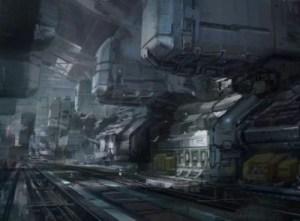The most beautiful stories always start with wreckage. – Jack London
Lexi opened her eyes and gazed about at the wreckage. Scratch that; she opened her right eye, because despite her effort the left seemed unable to open. Indeed, the entire left side of her body seemed to have been damaged in the crash; her left leg seemed mostly all right, but her left arm was stiff and weak, she thought she might be deaf in her left ear, and she didn’t want to think too hard about what the left side of her head must look like.
On top of all that, she wasn’t able to get up at all, and wondered if something might be wrong with her back. A little exploration with her right hand, however, revealed that the problem was external; she was pinned down by a steel beam across her midsection. Carefully, gingerly, she began to inch her body backward, hoping to draw back far enough that she could eventually sit up or roll over; she made just enough progress to encourage her to continue, and after a long series of adjustments she was finally clear enough to roll up onto her right side in order to survey the situation more thoroughly.
 What she saw did nothing to ameliorate her concerns: the ship was an utter shambles, and there was no sign of motion from any other crew member beside herself. She called out as best she could, but her voice sounded weak and unfamiliar to her own ear; there was no response of any kind, and after a few more tries she gave up and resumed her efforts to extricate herself from the debris without help. Her new position allowed her to reach a cable trunk, and pulling on it allowed her to make faster progress than mere inching; soon she was clear enough to sit up, and despite the near-uselessness of her left arm she was standing up a few minutes later.
What she saw did nothing to ameliorate her concerns: the ship was an utter shambles, and there was no sign of motion from any other crew member beside herself. She called out as best she could, but her voice sounded weak and unfamiliar to her own ear; there was no response of any kind, and after a few more tries she gave up and resumed her efforts to extricate herself from the debris without help. Her new position allowed her to reach a cable trunk, and pulling on it allowed her to make faster progress than mere inching; soon she was clear enough to sit up, and despite the near-uselessness of her left arm she was standing up a few minutes later.
Well, it was a reasonable approximation of standing, anyhow; “leaning on a bulkhead” would be a much more accurate analysis. But she was mostly vertical and mostly mobile, and that allowed her to move out of the storage bay in which she had been trapped; she soon found what she needed to patch up all the obvious damage to her body that her inexpert senses could locate, and then she limped up to the control deck. That wasn’t much easier than pulling herself out of the wreckage had been; all the usual routes were blocked by jammed doors or fallen beams. But Lexi had a resourceful nature; she eventually made her way up a service crawlway, removing a panel to come up through the deck onto the bridge.
All that had come before was the easy part; Lexi was not a member of the bridge crew and therefore had no idea how to use any of the equipment there. But she could use a computer, so she knew she’d be able to eventually figure out how to activate the distress beacon even if the communications console proper were not functional. Here again she met obstacles: the main computer was nothing but junk, so she had to locate a functioning pocket model with the proper files, then locate those files and read as much of them as she could understand. With ship’s power down she had to rig up the communications console to a portable power source; given that she had never been trained to do that task and only barely understood the principles involved, it was almost a miracle that she was finally able, after considerable effort, to bring the panel to life and activate the distress beacon. After that, it was just a matter of waiting; there wasn’t much else she could do except sleep, so she did as much of that as she could while waiting for help to arrive.
******************************************************************************************************
“What a damned mess!” exclaimed Commander Norton. “Have they figured out yet how the distress beacon came on by itself after 17 days?”
“Yes, sir,” said Lieutenant Baker, “but you’re not going to believe it.”
“Try me.”
“Well, sir, the panel appears to have been manually rewired.”
“On an unmanned ship?”
“Apparently, sir, the work was done by one of the land exploration units.”
The older man glared at him. “Don’t bullshit me, son.”
“No bullshit, sir. Lieutenant Payne has worked extensively with the model, and she says their adaptive programming has often given rise to some pretty amazing results. Since they’re designed to explore alien worlds alone, they need considerable ability to learn new information and skills in order to deal with unforeseen problems. Apparently, LE-XI was able to recognize that it was the only robot to survive the crash, and consulted a portable database for instructions on getting the beacon online again.”
“That’s hard to believe, even for adaptive programming.”
“Lieutenant Payne said the same thing, sir; she said that LE-XI had demonstrated an unprecedented level of autonomous action, and she wondered if the crash might not have resulted in some serendipitous change to its brain function. The left side of its head is bashed in pretty badly, and if it hadn’t awakened and offered a report upon our entry to the bridge, I would never have believed it was still functional.”
They had been walking up the hull for most of the conversation, and had now reached the place where the salvage mission had cut through into the bridge. Baker’s appraisal of the robot’s condition had been generous: there was a dent in its head the size of a large man’s hand, and the sensory apparatus on that side was smashed. Its left arm was bent so badly its left hand wasn’t far from the elbow, and its torso was in terrible shape. But its head swiveled crookedly on its neck assembly when the commander entered, and its remaining eye focused on him when he spoke.
“So this is the robot who saved the mission?”
“Yes, sir,” said Lt. Payne. “LE-XI managed to exceed her programming remarkably. Lexi, this is Commander Norton.”
“I’m very pleased to meet you, Commander; I hope I performed adequately.” The robot’s voice unit had also been damaged, so that instead of the clear mezzo-soprano it was designed to produce a childlike soprano emerged. Norton had always felt a bit silly talking to robots as though they could actually think, but in this case the illusion of personality was extremely strong.
“More than adequately, Lexi. Your actions allowed us to recover the data and samples you and the others collected here.” Norton ignored Payne’s ill-disguised grin; in spite of himself, he did feel gratitude and even a bit of admiration toward the damaged machine.
“And what’s more, Lexi,” Payne added excitedly, “we’re going to take you back to Earth to figure out how you did it, and maybe we can build more robots as smart as you are. I’m going to shut you down now for the trip, is that OK?”
“Yes ma’am, whatever you say,” Lexi replied, satisfied in her way that she had pleased her makers and looking forward to the prospect of a long and restful sleep.
